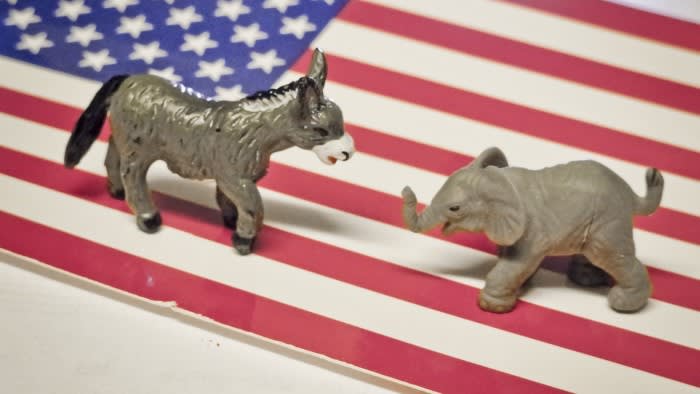Unlock the US Election Countdown newsletter for free
The stories that matter on money and politics in the race for the White House
Different situations call for different classic investment books to be pulled down from the shelf. In a roaring bull market, you might want to familiarise yourself with Reminiscences of a Stock Operator. At a different point in the cycle, you might reach for a collection of the maxims of Warren Buffett.
This week, though, there’s really only one thing to pack for the commute; John Coates’ 2012 masterpiece, The Hour Between Dog And Wolf.
Coates is a neuroscientist who had previously been an options trader at Goldman Sachs and Deutsche Bank. His book applied biology to finance, detailing the results of studies carried out on the hormonal balances of traders, and general results about human behaviour and decision-making under conditions of stress.
As the FT review put it:
In male traders — and most are young men — a run of success creates a testosterone-fuelled “winner effect” in which the trader is biologically driven to take ever greater risks. When he crashes into huge losses, his whole personality changes (a transformation that Coates calls the “hour between dog and wolf”, a phrase apparently popular in medieval times to denote the period of confusion and potential metamorphosis around dusk). The cowed trader becomes apathetic and, for a while at least, excessively risk-averse.
In other words, it’s the perfect framework to think about the environment we’re going to see this week. A hugely important and unpredictable election, with lots of late night trading and major US news falling into European and Asian markets, potentially staffed up with young and inexperienced traders. And then there’s a Fed meeting on Friday.
Things are going to be volatile.
People don’t like to think too much about the fact that — no matter how sophisticated the systems and algorithms making the trades are — the ultimate decisions are being made by human animals that eat, sweat and excrete. (One of the most memorable passages in Coates’ book describes the state of the men’s’ bathrooms at Goldman Sachs on a particularly bad trading day during the dotcom bust).
But whenever we’re talking about “vibes” and “sentiment”, to a very large extent we’re talking about chemicals in the bloodstream, the sorts of things which in less complicated beasts are linked to instincts of fighting, running away and reproduction. None of which you’re meant to do while you’re trading short term interest rates.
So the kinds of behaviours that people really want get controlled and sublimated into recognisable trading patterns. For example, in conditions of “novelty, uncertainty and uncontrollability”, the body produces cortisol, a hormone that’s associated with a desire to avoid risk and seek familiarity. In markets, this shows up in reduced liquidity and wider spreads — which in turn cause more volatile price swings, exacerbating the stress in a sort of feedback loop.
It’s not impossible that there’s an element of cortisol reaction in the way that specialist Election Data Knowers have tended to make adjustments to avoid standing out from the crowd.
At some point, though, someone is going to get the sense that they’re winning — either in terms of the political party they support, or their trading position. This is also self-reinforcing, because the “winner effect” (established to a surprising degree of statistical certainty by taking urine tests from the crowd at World Cup Finals) generates a surge of testosterone.
That hormone makes people more confident in their decisions and inclined to increase their risk. It’s the sort of thing that, for example, might cause someone to end up with $30mn at stake on prediction markets.
It’s possible to mitigate the effects, a bit. Trading desks which employ women (and men old enough to enjoy the cognitive benefits of declining testosterone levels) are less likely to get carried away, as Coates demonstrated. You’re less vulnerable to falling into a cortisol slump if you’ve done sufficient preparation and have enough experience to be able to deal with things “pre-attentively”, without too much conscious thinking.
And there’s decent evidence from sport and military contexts to believe that repeated exposure to “thermal shock” can harden the hormonal system and reduce the tendency to wild swings.
So, taking a cold shower before the market gives you an ice bath might be sound advice. But the main takeaway from “The Hour Between Dog And Wolf” is that there’s really not much that can be done in situations that some traders are likely to find themselves in tonight.
Investors have always hated political risk because it’s impossible to analyse, it’s extremely difficult to hedge and it’s not what they’re used to — the exact trio of “novelty, uncertainty and uncontrollability” which causes the brain to shut down.
We might have to accept that this week is going to be a mistake-rich environment and pick up the pieces later when we’ve all calmed down.
https://www.ft.com/content/25ed870c-273e-49cc-b752-280811a7573f


